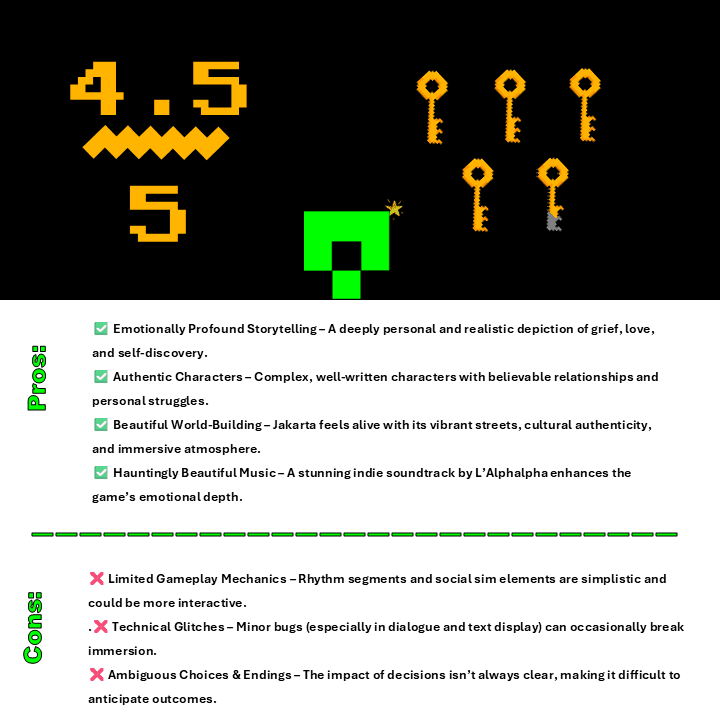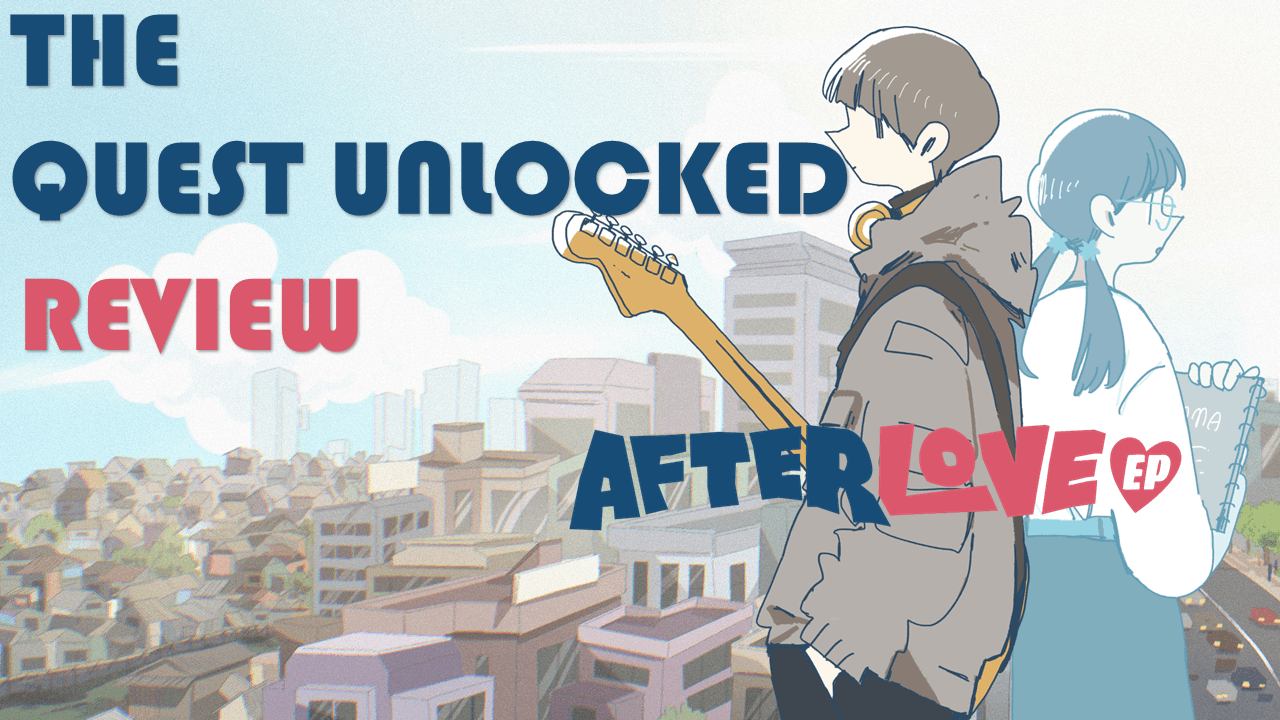
My journey with Afterlove EP began with curiosity, but it quickly became something much deeper—a profoundly emotional and transformative experience. As someone who appreciates games that tell deeply personal stories, I was eager to see how this game would handle themes of grief, self-discovery, and healing. What I didn’t anticipate was how deeply it would resonate with my own experiences and challenge my understanding of loss and recovery.
From the outset, I knew this review had to do justice to the game’s emotional weight. I dedicated hours to playing and replaying different paths, analyzing its nuances, and reflecting on my own connections to its themes. This meant postponing other projects and stepping away from lighter content to fully immerse myself in the world of Jakarta, its music, and its beautifully flawed protagonists, Rama and Cinta.
First Encounters: Expectations vs. Reality
When I first encountered Afterlove EP, I assumed it would be a simple, heartwarming visual novel with light rhythm gameplay. The hand-drawn, indie-art style evoked a cozy experience, and the premise suggested a typical story of loss and moving on. But from the first few minutes, it became clear that this was not just another narrative game—it was something raw, real, and profoundly human.
One of the most unexpected aspects was how unflinchingly it portrayed grief. Rather than giving Rama a clear-cut path to healing, the game allows him to stumble, retreat into himself, make selfish choices, and even hurt those around him. It’s uncomfortable at times, but that discomfort is precisely what makes Afterlove EP such an honest depiction of loss.
A Pivotal Moment: When It Truly Hit Me
There was a moment in Afterlove EP that completely shattered me. Rama, struggling to reconnect with his bandmates, finds himself at a crossroads. During a rehearsal, tension rises as the unspoken resentment between him, Adit, and Tasya finally boils over. The session falls apart, and in frustration, Tasya tells Rama something brutally honest: “You weren’t the only one who lost something when Cinta died.”
It was a gut-punch moment. It made me reflect on times in my own life when I became so lost in my grief that I failed to see how it impacted those around me. This wasn’t just a story about a grieving musician—it was a reflection of the messy, complicated ways people process loss differently.
Deep Personal Resonance
As I played through Rama’s story, I couldn’t help but draw parallels to my own experiences. The way grief lingers, the way memories become both a comfort and a weight, the way moving on feels like a betrayal—I’ve felt all of that before. Cinta’s presence as a voice in Rama’s head struck a particular chord with me. The conversations between them, sometimes tender, sometimes frustratingly cyclical, mirrored the way we all replay moments with lost loved ones in our minds, questioning what we could have done differently.
The game also challenged me to see grief from different perspectives. It wasn’t just Rama’s story—it was also the story of his friends, his band, and the people he meets along the way. It reminded me that while loss feels isolating, it is never experienced in a vacuum.
The Heart of the Game: Story, Gameplay, and Music
Story and Characters
The narrative in Afterlove EP is among the most authentic I’ve ever encountered in a game. Rama is not a perfect protagonist—he is selfish, he makes mistakes, and he sometimes refuses to listen. But that’s what makes his journey so compelling. Watching him slowly, painfully learn to reconnect with others is incredibly rewarding.
The supporting cast is equally strong. Tasya and Adit, his bandmates, have their own struggles and frustrations, and their interactions with Rama feel genuine rather than forced. Other characters, like Satria, the record store owner, bring additional depth to the story, offering different perspectives on love, identity, and moving forward.
Gameplay Mechanics
At its core, Afterlove EP is a visual novel, but it integrates social simulation and rhythm game elements in meaningful ways. Each day, you must choose how Rama spends his time—whether it’s rehearsing, reconnecting with friends, going to therapy, or simply reminiscing about Cinta.
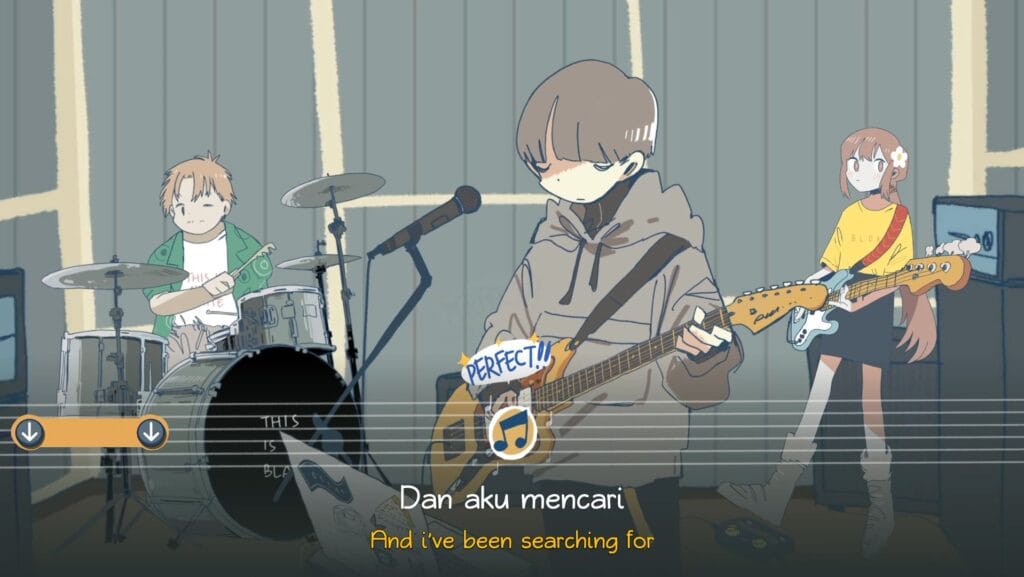
The rhythm mechanics, though simple, serve a purpose beyond just being a minigame. The difficulty subtly changes depending on Rama’s emotional state, making each session feel like an extension of his struggles or breakthroughs.
World-Building and Atmosphere
Jakarta is more than just a setting in Afterlove EP—it is a character in itself. The vibrant streets, the small food stalls, the city’s unique blend of modernity and tradition—all of it is rendered in loving detail. The game doesn’t just tell you about Jakarta; it makes you feel like you’re walking its streets, soaking in its sights and sounds.
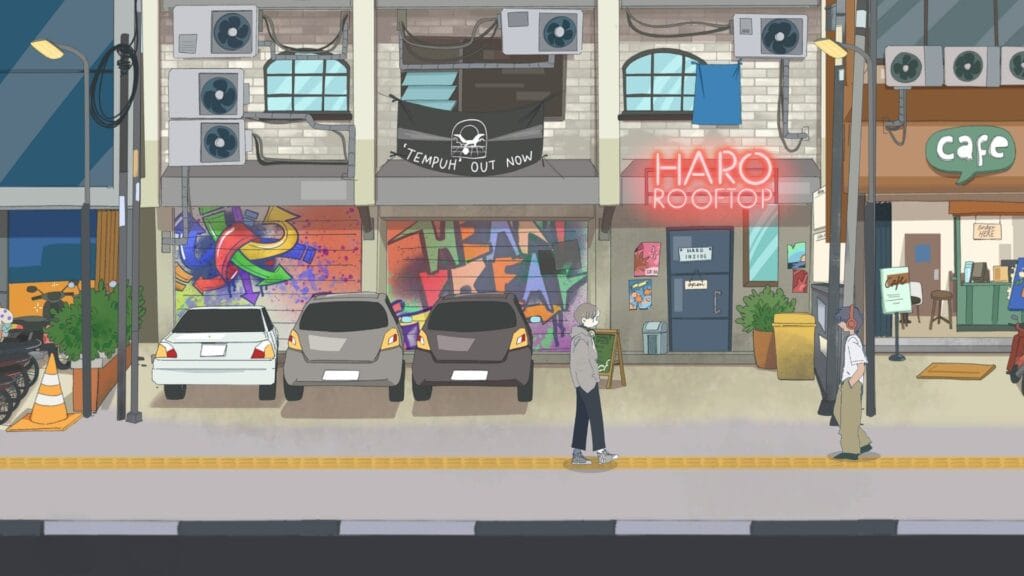
Music and Sound Design
Music is the soul of Afterlove EP. The soundtrack, composed by Indonesian indie band L’Alphalpha, perfectly complements the game’s themes of longing, healing, and nostalgia. Whether it’s the melancholic background score during quiet moments or the energetic band sessions, every track adds to the game’s emotional depth.
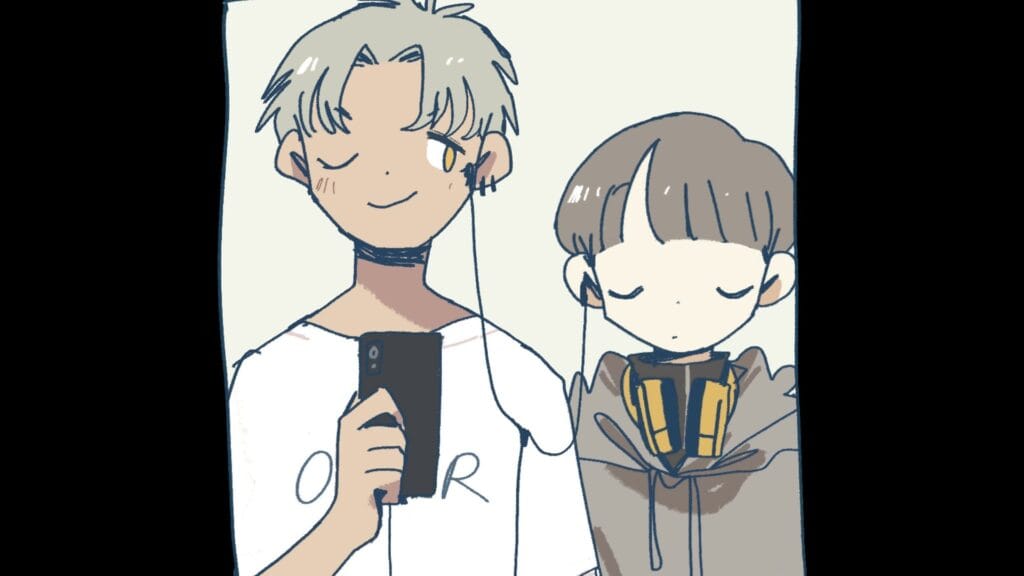
Cinta’s voice acting is another standout element. She is the only fully voiced character, reinforcing her ethereal presence in Rama’s mind. The way her tone shifts—from playful to sorrowful to exasperated—makes her feel hauntingly real.
Comparing Afterlove EP to other narrative-driven games, it sits comfortably alongside titles like Florence, Coffee Talk, and Spiritfarer. Like Florence, it captures the bittersweet beauty of love and loss through minimalist gameplay. Like Coffee Talk, it immerses players in an atmospheric world filled with richly written characters. And like Spiritfarer, it offers a meditation on grief that lingers long after the game ends.
But what makes Afterlove EP unique is its refusal to offer a straightforward resolution. Unlike many stories about grief that focus on “closure,” this game acknowledges that moving on isn’t about forgetting—it’s about learning to live with the memories.
A Lasting Impact
As the credits rolled on Afterlove EP, I sat in silence, letting the weight of the experience settle. It’s rare for a game to leave such a profound impact, but this one did. It made me reflect on my own relationships, my own ways of processing grief, and the importance of the people who pull us back when we’re lost in ourselves.
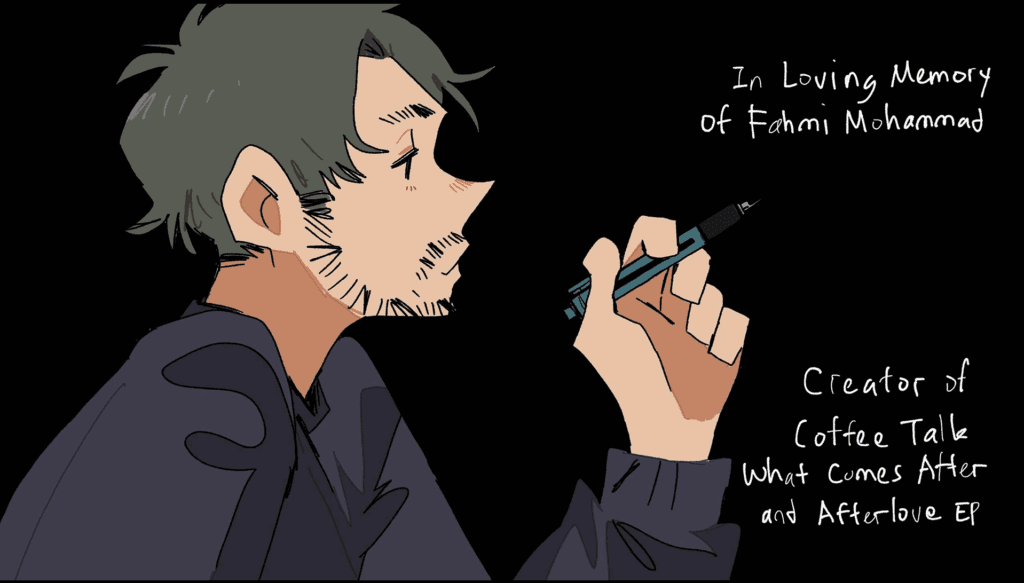
Mohammad Fahmi’s influence is evident throughout Afterlove EP, and knowing that this was his final project adds another layer of poignancy. It’s a beautiful, heartfelt tribute not just to love and loss, but to the power of storytelling itself.
For anyone who has ever lost someone, felt stuck in the past, or struggled to move forward—this game is for you. Play it, and let it sit with you. I promise it will be worth it.
[This review is based on a press build of the game provided by the publisher. The Game has been reviewed on PS5]
